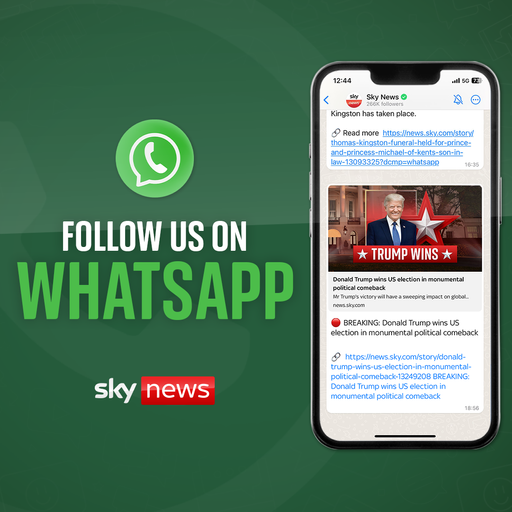Why does Trump want Greenland and the Panama Canal?
The two locations, which are nowhere near each other geographically, pose different interests to the incoming president. But Mr Trump’s intentions has caused immense backlash.
Since winning re-election, president-elect Donald Trump has expressed an interest in acquiring Greenland and the Panama Canal.
Speaking at a news conference on Tuesday, Mr Trump said he could not assure reporters that military or economic coercion would not be used to try and gain control of both areas.
“I can say this, we need them for economic security,” he said.
The two locations, which are nowhere near each other geographically, pose different interests to the incoming president.
But his desire to seize them both has caused immense backlash.
Why does Trump want Greenland?
Greenland is the world’s largest island and a semiautonomous territory of Denmark. With a population of 57,000, it has been part of Denmark for 600 years.
It is also a founding member of NATO and is home to a large US military base.
Straddling the Arctic circle between the US, Russia and Europe, the island offers a unique geopolitical advantage, that America has eyed for more than 150 years.
It’s even more valuable as the Arctic opens up more to shipping and trade.
The idea of purchasing Greenland is not a new idea for Mr Trump, as it came up during his first term in office. But he has since reiterated the benefit it could have for America’s national security.
“We need greater national security purposes,” Mr Trump said. “I’ve been told that for a long time, long before I even ran.
“People really don’t even know that Denmark has any legal right to it, but if they do, they should give it up because we need it for national security.”
Mr Trump’s claim to the island coincided with a visit by his son, Donald Trump Jr, who was in Greenland filming for a documentary, Sky News US partner network, NBC News said.
Analysis: Trump’s threats could be a make-or-break test for NATO
Rich in natural resources
As well as its location, Greenland holds rich deposits of various natural resources.
Locked inside the island are valuable rare earth minerals needed for telecommunications, as well as uranium, billions of untapped barrels of oil and a vast supply of natural gas that used to be inaccessible but is becoming less so.
Many of the same minerals are currently mostly supplied by China, so other countries such as the US are interested in tapping into available resources closer to home.
A front-row seat to the climate crisis
More than the oil, gas or minerals, Greenland has a lot of ice – and provides a front-row seat to the globe’s climate crisis.
If that ice melts, it would reshape coastlines across the globe and has the potential to dramatically shift weather patterns.
In fact, Greenland holds enough ice that if it all melts, the world’s seas would rise by 24ft (7.4m).
Greenland also influences hurricane and winter storm activity. Because of its mountains of ice, it has the power to change patterns in the jet stream, which brings storms across the globe and dictates daily weather.
Often, especially in winter, a blocking system of high pressure off Greenland causes Arctic air to plunge to the west and east, sweeping across North America and Europe, winter weather expert Judah Cohen told the Associated Press.
What effect could this have on the UK?
British politician and security expert, Mike Martin, explained on X that the seas between Greenland and the UK – which has Iceland in the middle – are “utterly vital” for NATO.
He explained that during the Cold War, the UK would often have 50 ships stationed in the area to look after the Greenland-Iceland-UK (GIUK) gap – which is the “only sensible route” that the Russian northern fleet has to get into the Atlantic Ocean.
Both the UK and Denmark continue to have a shared security interest in the gap.
The UK government website states that as part of the UK’s Arctic Policy Framework, it will continue to develop military capability in collaboration with Denmark, to allow it to operate in the region and in order to safeguard UK interests and those of its allies.
However, if overtaken by the US, this collaboration could be affected.
‘Greenland is not for sale’
Addressing Mr Trump’s comments in an interview with Danish broadcaster TV2, Danish Prime Minister Mette Frederiksen said she did not believe the US would use military or economic power to secure control over Greenland.
“Greenland is not for sale,” Ms Frederiksen said, adding: “We need to stay calm and stick to our principles.”
Referring to the US as Denmark’s “most important and closest ally” she said she welcomed the US taking a greater interest in the Arctic region, but said it would have to be done in a way that is “respectful of the Greenlandic people”.
In the past, Greenland’s Prime Minister Mute Egede has called for independence from Denmark, but said he has no interest in the island nation becoming part of the US.
While Aaja Chemnitz, a Greenlandic member of the Danish parliament, added: “Most people don’t want it.
“I think some people find it quite disrespectful. And the way it has been done, and just the fact that you’re saying that you can buy another country.”
French foreign minister Jean-Noel Barrot also weighed in on the matter, saying on Wednesday that the European Union would not let “other nations of the world attack its sovereign borders, whoever they are”.
“If you’re asking me whether I think the United States will invade Greenland, my answer is no. But have we entered into
a period of time when it is survival of the fittest? Then my answer is yes,” Mr Barrot said.
Why does Trump want the Panama Canal?
The Panama Canal is a waterway that connects the Caribbean Sea with the Pacific Ocean. It acts as a shortcut route, saving time and costs for transporting goods, according to the Embassy of Panama website.
Under the Jimmy Carter administration, control of the canal was handed from the US to Panama in 1979, with the US ending its joint partnership in controlling the strategic waterway in 1999.
It is now administered by the Panama Canal Authority, an autonomous government entity, although a Hong Kong-based contractor operates two ports connected to it, NBC reported.
Mr Trump has claimed that the US is being treated unfairly when it is “overcharged” higher rates for its ships to sail the canal than those of other countries.
He claimed that Panama is in “violation” of a deal with the US and that “China is basically taking it over”.
“We gave the Panama Canal to Panama. We didn’t give it to China,” Mr Trump said on Tuesday. “They’ve abused that gift.”
Panamanian President Jose Raul Mulino denied in a video statement last month that China has influence over the canal and shot down the idea of the US taking back authority over it.
“Every square meter of the canal belongs to Panama and will continue to be so,” he said.
Could Trump actually do it?
The incoming president has offered few details on how he might carry out his plans to grow the US footprint, even as he promised throughout the news conference to return the country to a “golden age” of improved national security and “common sense”.
If Greenland becomes independent, it could choose to become associated with the US.
One option could be to form a so-called “free association” pact with America, similar to the status of Pacific island nations Marshall Islands, Micronesia and Palau.
Mr Trump has also suggested he would impose tariffs on Denmark if it resists his offer to purchase the island.

Be the first to get Breaking News
Install the Sky News app for free


This could make things difficult for Danish companies, particularly drugmakers like Novo Nordisk, which sells the weight loss drug Wegovy and the type 2 diabetes medicine Ozempic, according to investment magazine Barron’s.
Eswar Prasad, a professor of trade policy at Cornell University, told the magazine that the Trump administration could tailor specific tariffs to target products made by Danish companies regardless of where they are manufactured.


